Are you wondering how to add affiliate links to your WordPress site?
Adding affiliate links for third-party products/services on your website is a great way to generate passive income. Every time someone buys something through one of your links, you will make a small commission.
In this article, we will show you how to easily add affiliate links in WordPress with ThirstyAffiliates. We will also share some tips to improve your affiliate marketing strategy.
Why Use ThirstyAffiliates for Affiliate Links in WordPress?
An affiliate link is a special type of link that you add to your online content. You can earn a commission if a visitor clicks on the link and then makes a purchase on the affiliated website.
If you have a WordPress blog, then affiliate marketing can add a steady income stream and improve your monetization strategy.
To add affiliate links in WordPress, you will need to use an affiliate link management plugin. This makes it easy to design custom affiliate links, track their performance, and more.
ThirstyAffiliates is one of the best affiliate link management plugins for WordPress that allows you to store your affiliate links, organize them in categories, and manage them more efficiently.
It even helps you create branded URLs, comes with a search form, and allows you to automatically replace keywords with affiliate links, making it a complete solution.
For more details, you may want to see our comparison of Pretty Links vs. ThirstyAffiliates: which is right for your site?
Note: We use ThirstyAffiliates on WPBeginner for affiliate link management.
Having said that, let’s see how to easily add affiliate links in WordPress with ThirstyAffiliates. You can use the quick links below to jump to different parts of our tutorial:
How to Install and Set Up the ThirstyAffiliates Plugin
First, you will need to visit the ThirstyAffiliates website and click on the ‘Pricing’ tab in the top right corner of the screen.
This will take you to the ‘Pricing’ page, where you have to select a subscription plan that suits your needs.
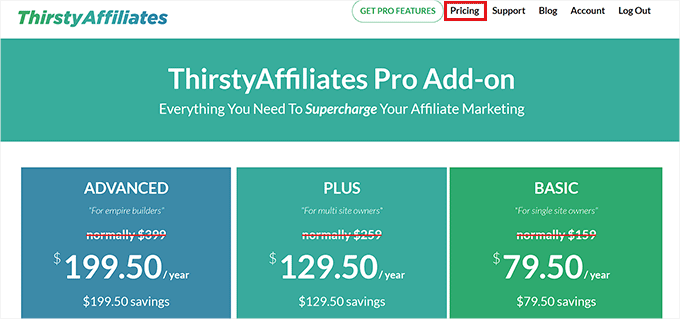
Once you have done that, you need to visit your WordPress website to install and activate the ThirstyAffiliates plugin. For detailed instructions, you may want to see our beginner’s guide on how to install a WordPress plugin.
Note: ThirstyAffiliates also has a free version that you can use. However, we will be using the premium plugin to unlock more features.
Upon activation, visit the ThirstyAffiliates » Settings page from the WordPress admin sidebar and switch to the ‘License’ tab in the left column.
Here, simply paste your license key for the plugin and click the ‘Activate License Key’ button.
You can find this information in your account on the ThirstyAffiliates website.
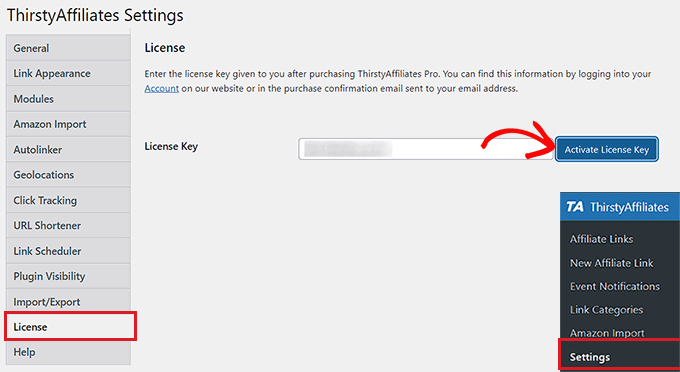
Next, switch to the ‘Link Appearance’ tab from the sidebar on the left to configure some settings.
Once you are there, you can start by choosing a link prefix from the dropdown menu. This prefix will be used in your cloaked link before the link slug.
For example, if you choose the ‘Recommends’ option as the link prefix, then your affiliate links will look like this:
http://www.your-site.com/recommends/link-name
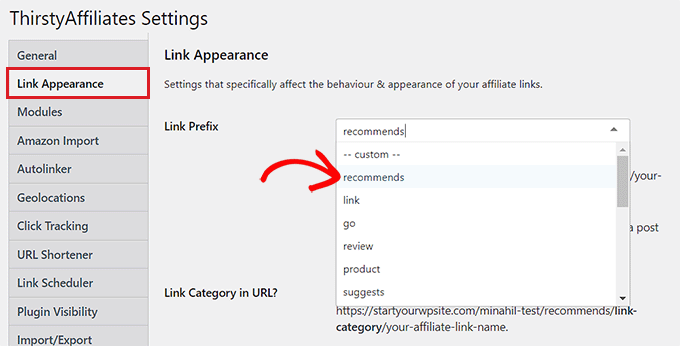
You can also create a custom link prefix by selecting the ‘Custom’ option from the ‘Link Prefix’ dropdown menu.
Once you’ve done that, simply type the link prefix of your choice into the ‘Custom Link Prefix’ field. In our example, we are using ‘refer’.
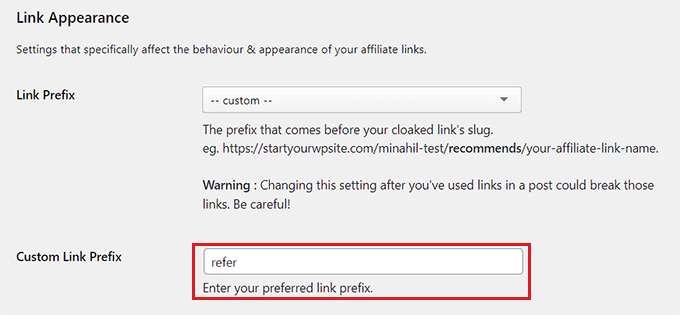
After that, you can also check the box next to the ‘Link Category in URL?’ option if you want to show the selected affiliate link category in the URL.
This will add a link category to the URL after the link prefix and before the link slug like this:
http://www.your-site.com/refer/category/link-name

Next, scroll down to the ‘Use nofollow on links?’ section and select the ‘Yes’ option from the dropdown menu.
This means that the nofollow attribute will now be added to all your affiliate links, which will tell the search engines not to pass a small portion of your authority to the other website.
We recommend using this option because it’s a general SEO best practice. For more details, you may want to see our step-by-step guide on how to add nofollow links in WordPress.
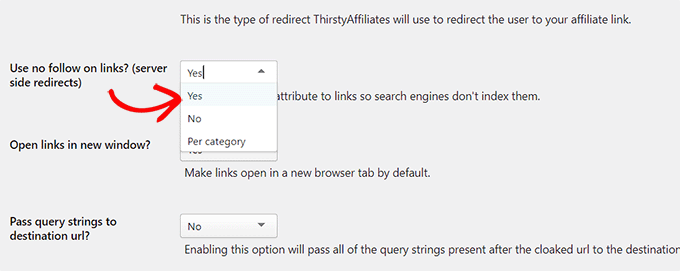
Once you’ve done that, you can also open all your affiliate links in new tabs by choosing ‘Yes’ next to the ‘Open links in a new window?’ option.
After that, you can leave the other settings as default or configure them as you like.
Finally, don’t forget to click the ‘Save Changes’ button at the bottom to store your settings.
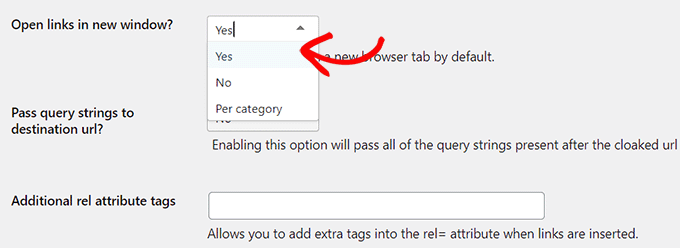
How to Add Affiliate Links in WordPress Using ThirstyAffiliates
Now that you have set up the plugin, you need to head over to the ThirstyAffiliates » New Affiliate Link page from the WordPress dashboard.
Once you are there, you can start by typing a name for your affiliate link in the ‘Add Title’ field.
As this name will be used in the cloaked URL created by ThirstyAffiliates, we recommend using the product or service name as the link title.
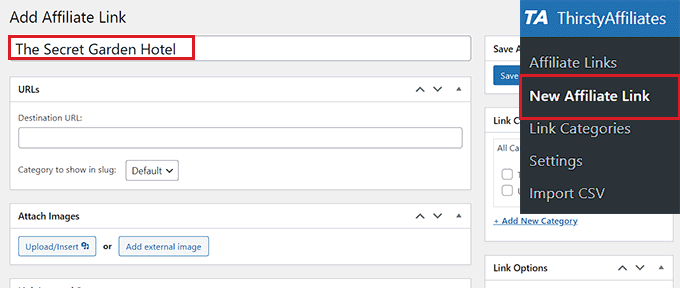
Next, you have to add the full affiliate link with your affiliate ID in the ‘Destination URL’ field.
You can also attach an image to your affiliate link by clicking on the ‘Upload/Insert’ button under the ‘Attach Images’ section.
This will launch the media library on the screen, where you can upload an image of your choice.
We recommend using this setting if you want to display affiliate links in sidebars or have templates where links can be shown with images.
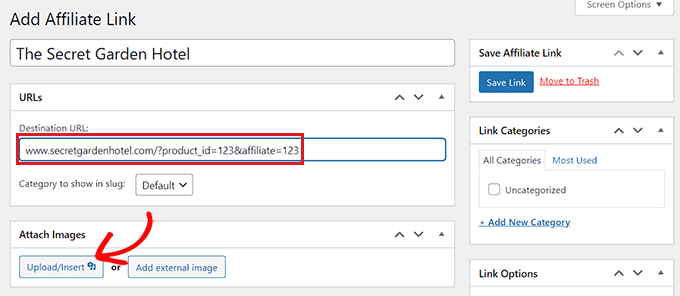
Now, scroll down to the ‘Autolink Keywords’ section and type the keywords that you want to automatically link to this particular affiliate link.
This will save you a lot of time when writing a blog post on your website, as the affiliate links will be automatically added once you type in a specific keyword.
Next, you can also set a limit for auto-linking in the ‘Limit (per keyword):’ option.
For example, if you type the number 3 in this field, then ThirstyAffiliates will automatically stop auto-linking the affiliate link with the specific keyword after the first three times.

After that, you can also sort your links into categories. To do this, simply click the ‘+ Add New Category’ link in the ‘Link Categories’ section on the right.
From here, type the category name that suits your affiliate link and click the ‘Add New Category’ button.
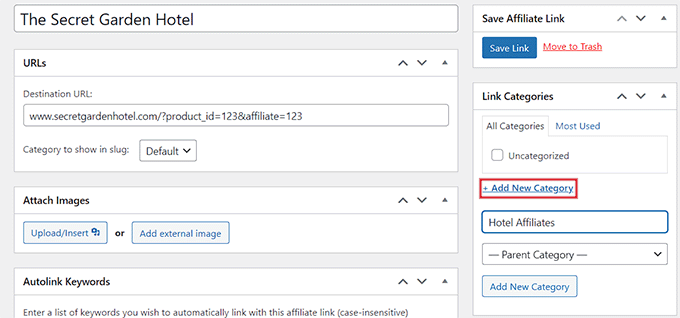
After that, scroll down to the ‘Link Options’ section in the right column and select if you want to add the nofollow attribute, open the link in a new tab, pass the query string to the destination URL, and even change the redirect type of your link.
You can also leave these settings as they are because they will already be configured according to the options that you picked when setting up the plugin.
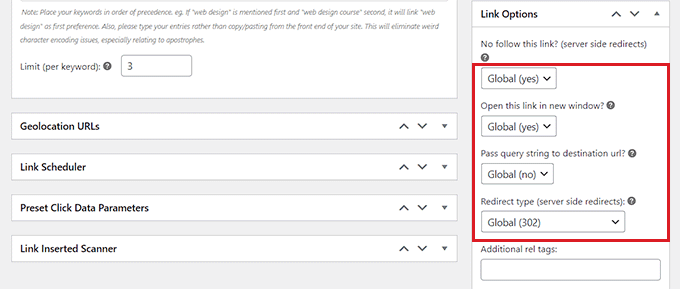
Finally, click the ‘Save Link’ button at the top to store your settings and create your first affiliate link.
Adding Affiliate Links in WordPress Posts and Pages
Aside from using the auto-linker, sometimes you may want to manually add affiliate links to your WordPress posts and pages.
To do this, open a post/page in the block editor from the WordPress admin sidebar.
Once you are there, you will notice that ThirstyAffiliates has added an ‘Affiliate Link’ button in the toolbar at the top of your blocks.
Now, to manually add an affiliate link to your WordPress post or page, simply select the anchor text for the link (the words you want to put the link on) and click the ‘TA’ icon in the block toolbar at the top.
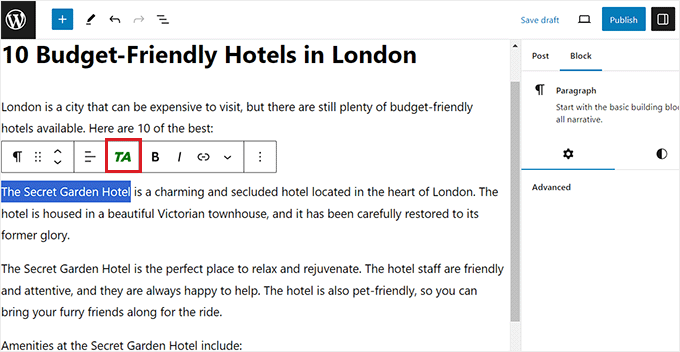
This will open a search form on the screen where you have to type the name of the affiliate link that you created.
Once the link appears in the search results, simply click on it to add it to the anchor text.
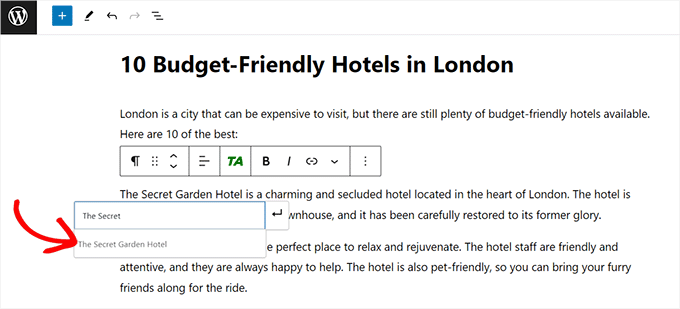
After that, don’t forget to click the ‘Publish’ or ‘Update’ button at the top to store your settings.
You have now successfully added an affiliate link to your WordPress page/post.
Managing Affiliate Links in ThirstyAffiliates
ThirstyAffiliates uses built-in WordPress functionality to manage links. Links added via the ThirstyAffiliates plugin are added into a custom post type, which makes it really simple to add, edit, or delete them.
To manage your affiliate links, simply visit the ThirstyAffiliates » Affiliate Links page from the admin area.
Here, you can click on the ‘Edit’ link under the affiliate link of your choice to make some changes or click on the ‘Trash’ link to delete it.
You can also use the ‘Filters’ option at the top to filter all your affiliate links according to categories.
If you have the statistics add-on activated, then it will also show you the number of clicks for each link broken down into daily, weekly, and monthly clicks.
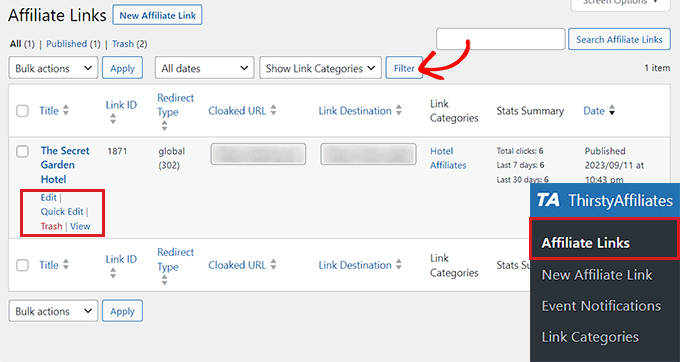
To view the full statistics report, just visit the ThirstyAffiliates » Reports page from the WordPress admin sidebar.
From here, you can easily get a statistics report for your affiliate link performance over the last year, month, or week. You can even set a custom date for your report.
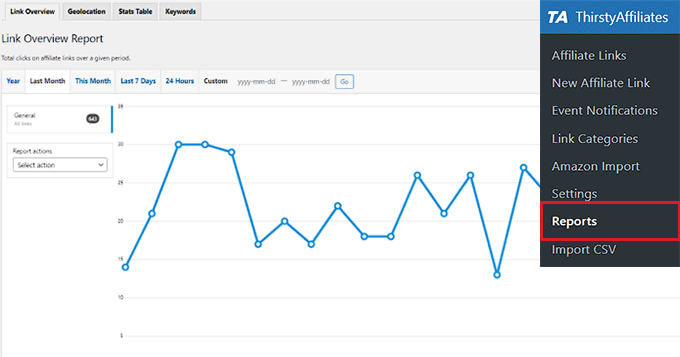
This can help you show which link categories are performing better, which links are getting more clicks and fewer sign-ups, and which ones are getting fewer clicks and more signups.
You can then improve your content strategy to maximize your earning potential.
Bonus Tips for Affiliate Marketing
Affiliate marketing is a super easy way to earn money online. If you are new to affiliate marketing, then the first step is to find a product or company that you are passionate about and would like to promote.
Once you’ve done that, you can partner with that company by asking to join their affiliate program and then using the affiliate ID provided by them to sell their products on your website.
You can typically find an affiliate program by searching for an ‘Affiliates’ page on a company’s website.
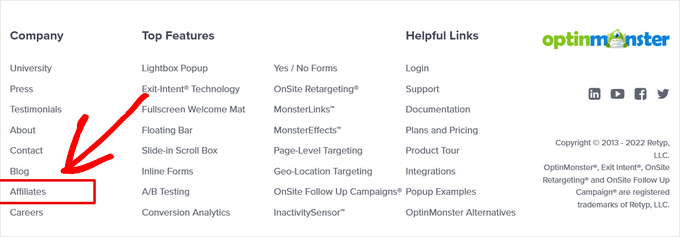
When choosing an affiliate program, it is important to pick a reputable company and recommend a product that you personally use and trust.
In addition, try to find affiliate programs that are relevant to your audience and sell products/services that your visitors may need.
For example, if you run a food blog, then you might want to endorse kitchen appliances, cookbooks, or food-related merchandise that your users may already be interested in.
Moreover, don’t try to overstuff your content with irrelevant affiliate links, as the key to driving traffic to your website and affiliate products is to create quality content.
For more tips, you may want to see our ultimate affiliate marketing guide for beginners.
Apart from affiliate links, you can also use affiliate product boxes on your website to further highlight the products that you want to promote.

This strategy can boost sales, increase brand exposure, and save time and resources.
For more details, please see our tutorial on how to create an affiliate product box in WordPress.
We hope that this article helped you learn how to add and manage affiliate links in WordPress with ThirstyAffiliates. You may also want to see our tutorial on how to build an Amazon affiliate store in WordPress and our expert picks for the best WordPress themes for affiliate marketing.
If you liked this article, then please subscribe to our YouTube Channel for WordPress video tutorials. You can also find us on Twitter and Facebook.

